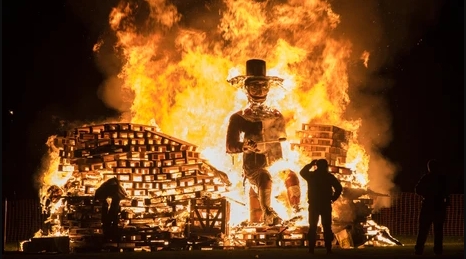Is Guy Fawkes still relevant to Kiwis?
The origin of Guy Fawkes dates back to 1605 in London, England, when he, along with 11 other men, tried to blow up the Houses of Parliament. The aim was to kill King James I and MPs in protest against the refusal to grant greater religious tolerance towards Catholics.
Fawkes was tried, convicted and executed, and a day of celebration at The Gunpowder Plot plot being foiled was celebrated in the UK and across the British Empire.
Guy Fawkes Day in New Zealand has evolved over time to primarily involve fireworks displays, it’s also a time for family and community gatherings. However, in Britain it’s more common to have bonfires and burn effigies of Guy Fawkes.
So how relevant is commemorating this event in New Zealand today?
A group of 15 students and teachers from Wintec School of Media Arts were asked what they know about the history of Guy Fawkes, who he was and why it is celebrated with fireworks today.
Most were unable to form a personal connection to ‘Guy Fawkes’ but could comment on how fireworks related to them in some way.

“Who’s Guy Fawkes” was one comment from an international student, Lisette Elisala
“I only know him out of V for Vendetta” – Chad Merriman
One student, Olivia Ludbrook said she had “no idea” about the history of Guy Fawkes.
“Some guy committed a crime that later got celebrated” – Julia Bartley
Finnish born student, Nina Naveri said “I don’t understand why New Zealand celebrates an event that happened halfway across the world, centuries ago”
Journalism student Jordan Sing said Guy Fawkes means nothing to him but that fireworks on the other hand, are something he can find some meaning behind “fireworks are a way to advocate that something good has happened, they symbolize a bit of joy, it’s a seasonal thing, anytime I’ve seen fireworks be used, it’s for a celebration”
Adult learner Vanya Derwin said she doesn’t remember the entire story but knows the British parliament was blown up and we celebrate it because we were colonised with Britian at the time. She said she has a nostalgic connection to fireworks from her childhood and Guy Fawkes Day to her, is about getting together with family.
Senior Academic Abby Dalgety said that going to Huntly speedway and watching a good display is what Guy Fawkes Day is all about for her and her family. “Other than that, I know some guy blew up something.”
Programme Coordinator Cate Prestidge said Guy Fawkes was something she celebrated when she was a kid. “I come from a British background so we would burn an effigy, but it’s not so much about the history these days, it’s more about the festivities of watching fireworks.”
The survey revealed that in Aotearoa today, Guy Fawkes Day is viewed as a fun occasion to watch fireworks and get together with family and friends. However, the history of why we commemorate the 400-year-old tradition is not well known.




